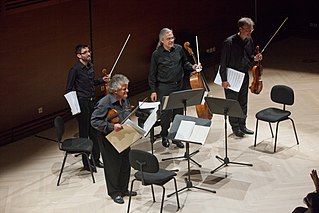
The Arditti Quartet is a string quartet founded in 1974 and led by the British violinist Irvine Arditti. The quartet is a globally recognized promoter of contemporary classical music and has a reputation for having a very wide repertoire. They first became known taking into their repertoire technically challenging pieces. Over the years, there have been personnel changes but Irvine Arditti is still at the helm, leading the group. The repertoire of the group is mostly music from the last 50 years with a strong emphasis on living composers. Their aim from the beginning has been to collaborate with composers during the rehearsal process. However, unlike some other groups, it is loyal to music of a classical vein and avoids cross-genre music. The Quartet has performed in major concert halls and cultural festivals all over the world and has the longest discography of any group of its type. In 1999, it won the Ernst von Siemens Music Prize for lifetime achievement, being the first and only group to date to receive this award.
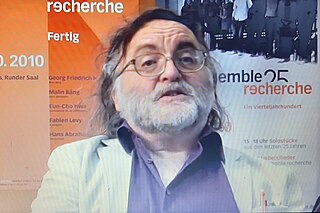
Brian John Peter Ferneyhough is an English composer. Ferneyhough is typically considered the central figure of the New Complexity movement. Ferneyhough has taught composition at the Hochschule für Musik Freiburg and the University of California, San Diego; he teaches at Stanford University and is a regular lecturer in the summer courses at Darmstädter Ferienkurse. He has resided in California since 1987.

Esa-Pekka Salonen is a Finnish conductor and composer. He is the music director of the San Francisco Symphony and conductor laureate of the Los Angeles Philharmonic, Philharmonia Orchestra in London and the Swedish Radio Symphony Orchestra. In 2024, he announced his resignation from the San Francisco Symphony upon the expiration of his contract in 2025.
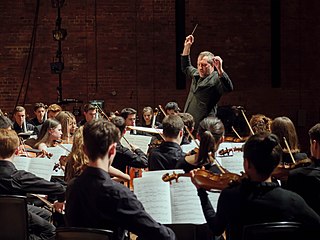
Thomas Joseph Edmund Adès is a British composer, pianist and conductor. Five compositions by Adès received votes in the 2017 Classic Voice poll of the greatest works of art music since 2000: The Tempest (2004), Violin Concerto (2005), Tevot (2007), In Seven Days (2008), and Polaris (2010).
Colin Matthews, OBE is an English composer of contemporary classical music. Noted for his large-scale orchestral compositions, Matthews is also a prolific arranger of other composer's music, including works by Berlioz, Britten, Dowland, Mahler, Purcell and Schubert. Other arrangements include orchestrations of all Debussy's 24 Préludes, both books of Debussy's Images, and two movements—Oiseaux tristes and La vallée des cloches—from Ravel's Miroirs. Having received a doctorate from University of Sussex on the works of Mahler, from 1964–1975 Matthews worked with his brother David Matthews and musicologist Deryck Cooke on completing a performance version of Mahler's Tenth Symphony.
Robert Saxton is a British composer.
Philip Cashian is an English composer. He is the head of composition at the Royal Academy of Music.
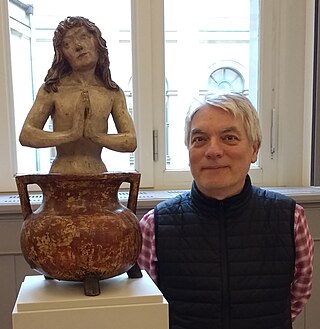
Simon Holt is an English composer.

Hilda Paredes is one of Mexico's leading contemporary composers, and has received many prestigious awards for her work. She currently resides in London, and is married to the noted English violinist, Irvine Arditti.
Luc Van Hove is a Belgian composer of contemporary classical music.
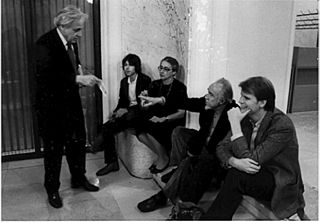
The International Society for Contemporary Music (ISCM) is a music organization that promotes contemporary classical music.
Joe Cutler is a British composer who grew up in Neasden and studied music at the Universities of Huddersfield and Durham, before receiving a Polish Government Scholarship to study at the Chopin Academy of Music in Warsaw, Poland. He has taught composition at the Royal Birmingham Conservatoire since 2000, and since 2005 he has been the Head of Composition there. In 2015 he was made Professor of Composition. He is also the co-founder of the instrumental ensemble Noszferatu.
David Sawer, is a British composer of opera and choral, orchestral and chamber music.
21st-century classical music is art music in the contemporary classical tradition that has been produced since the year 2000. A loose and ongoing period, 21st-century classical music is defined entirely by the calendar and does not refer to a musical style in the sense of Baroque or Romantic music.
Benet Casablancas Domingo is a Catalan composer and musicologist.
Michael Rosenzweig, born 1951 in Cape Town, South Africa, is a composer, conductor, choral trainer and director, multi-instrumentalist and jazz musician.
Claude Lenners is a Luxembourgish composer of mainly chamber and vocal works. In 1999, he founded Pyramide, an association for electronic music. Since 2004, he has headed its successor, Institut de recherche musicale.

David Felder is an American composer and academic who was a SUNY Distinguished Professor at the University at Buffalo until his retirement in 2022. He was also the director of both the June in Buffalo Festival and the Robert and Carol Morris Center for 21st Century Music.
Herman Vogt is a Norwegian contemporary composer.

Ziv "Kojo" Cojocaru is an Israeli composer, conductor and arranger who serves as Head of Composition, Conducting and Music Theory Department at the Jerusalem Academy of Music and Dance and as Conductor in Residence of the Israel Sinfonietta Orchestra.









